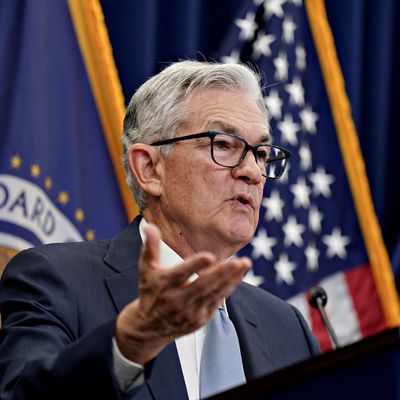
On Wednesday, the Federal Reserve announced that it would start slowing down its pace of interest-rate hikes, the recession-courting policy designed to keep inflation from spiraling out of control like it had earlier this year. The half-point hike — down from a recent series of three-quarter-point hikes — was thoroughly telegraphed in the media, with The Wall Street Journal’s Fed whisperer Nick Timiraos reporting more than a week ago what the Fed committee had in mind. Fed chair Jerome Powell also sent signals at his last press conference, noting the inflation rate was falling faster than most economists had predicted, making the draconian measures less necessary than before. But what could have been a triumphant moment for the central bank — the beginning of the end of one of the most difficult years for any Fed — turned instead into an off-note. The stock markets went into a tailspin as the Fed projected that rates would have to remain higher for longer than investors might have been expecting. The upshot: We may be done with the post-pandemic economic turmoil, but it’s not done with us.
During his 45-minute press conference after the rate-hike announcement, Powell said the word inflation at least 101 times, according to a machine transcription of his remarks. “We’ve made less progress than expected on inflation,” Powell said. For those who have been watching price movements during the last few months, this might be a surprise. The Labor Department’s consumer price index shows that, on average, prices have risen just 0.2 percent during the last five months — a stark turnaround from the high of 1.3 percent in June. But for Powell, the problem isn’t the price of cars or homes or even groceries — it’s the cost of what people pay other people for the work they do, and wages aren’t done rising. “There’s an expectation, really, that services inflation will not move down so quickly, so that we may have to raise rates higher to get to where we want to go,” Powell said.
Services inflation is economist-speak for wage gains, and it makes up more than half of the formula used to calculate inflation. We are still in boom times for people who want to get a new job — and those people are, in turn, getting better wages than those who stick around with their current employer. Wage gains, however, have been pretty consistently running well below the inflation rate for most of the pandemic. The worry, for an economist, is that this creates a kind of whiplash effect with too much money sloshing around the economy, which would, in turn, drive the price of goods back up. This means that the Fed wants to see unemployment run higher — and the number of job openings fall lower — before it would back off. “We believe you need to see a better balancing of supply and demand in the labor market,” Powell said. “It’s not that we don’t want wage increases. We want strong wage increases. We just want them to be at a level that’s consistent with 2 percent inflation.”
So the Fed will keep hiking borrowing costs, although probably at a slower pace and probably for longer than people thought just a few months ago. Not good news for the economy, just when it started to look like we didn’t have to worry about a recession after all. The Dow Jones had been trading higher for most of the day but then slumped some 675 points in the minutes after Powell started talking. (It ended up roughly where it started the day.) At this point, the Fed has hiked rates from 0 to 4.5 percent over ten months, the fastest pace in 40 years. The Fed governors project that they will be keeping rates above 5 percent throughout all of 2023 and only gradually easing them down after that. No one really knows what will happen if credit stays that expensive for that long — the last time it was that high was late 2006 through early 2008 and the economy hadn’t just been through a decade of the loosest policy on record. Still, it’s expensive out there — prices aren’t really going down as much as they’re not rising — and asking for weaker wage gains is a tough ask. Doing it without manufacturing a recession might be even harder.






























